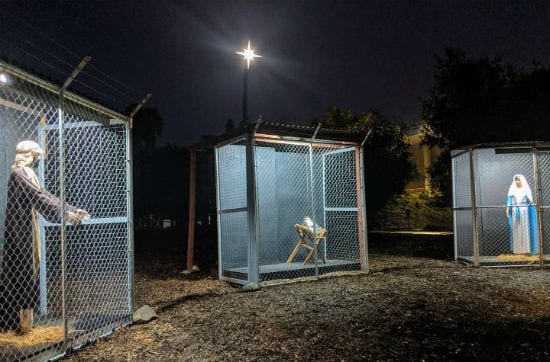"They say this is a different kind of war," Tony Lagouranis says. "Different rules for terrorists. Total crap."
Lagouranis was a military intelligence specialist in Iraq until he was honorably discharged due to "adjustment disorder." That seems to be a military psychologist's euphemism for still having his conscience and humanity mostly intact.
I've written before about the toll our nation's embrace of torture takes on the men and women ordered to carry it out. Laura Blumenfeld of The Washington Post puts a human face on this toll in "The Tortured Lives of Interrogators."
Blumenfeld tells Lagouranis' story alongside the stories of two other former interrogators. The other two, "James" and "Sheriff," worked for the Royal Ulster Constabulary in Northern Ireland and for Shin Bet, the Israeli security service. Unlike Lagouranis, James and Sheriff convey a cocky bravado, insisting that they have no qualms about the "verschärfte vernehmung"* they employed. James and Sheriff doth protest too much. They come across as deeply troubled, haunted, FUBAR.
"I've got a clean conscience because I rarely use it," Sheriff says. It comes across like a man in a wheelchair boasting that that his legs are not suffering from overuse.
Lagouranis may have gotten out in time to keep his own conscience from atrophying the way Sheriff's has. He realizes that he, like the people he was ordered to interrogate, has come away damaged:
Not the things I saw, but the things I did. You keep saying 'torturing the innocent,' but the two brothers I tortured were guilty. It doesn't mean you should torture them.
That word "should" denotes a moral imperative: You should not torture. Or in the familiar language of the King James Bible, Thou shalt not torture.
Such moral language strikes some as irrelevant. The question for them is not whether or not one should employ torture, but whether or not one needs to. This appeal to necessity is precisely what Sheriff relies on as an opiate to numb his fading conscience. "You leave us no choice," he would say to his victims.
The problem with this, of course, is that torture does not work. It produces misinformation. Practitioners of torture end up knowing less than they knew before. Worse, they can end up thinking they know all sorts of things that are not true. This "works" only if their only goal is to produce false confessions** or to serve as a deterrent, intimidating (i.e. terrorizing) others.
Members of the Intelligence Science Board underscored this point in their recent testimony to Congress. (Their (long) full report is available as a .pdf: "Educing Information: Interrogation: Science and Art.") From the article linked above:
President Bush has insisted that those secret “enhanced” techniques are crucial, and he is far from alone. The notion that turning up pressure and pain on a prisoner will produce valuable intelligence is a staple of popular culture from the television series “24” to the recent Republican presidential debate, where some candidates tried to outdo one another in vowing to get tough on captured terrorists. …
But some of the experts involved in the interrogation review, called “Educing Information,” say that during World War II, German and Japanese prisoners were effectively questioned without coercion.
“It far outclassed what we’ve done,” said Steven M. Kleinman, a former Air Force interrogator and trainer, who has studied the World War II program of interrogating Germans. … Mr. Kleinman, who worked as an interrogator in Iraq in 2003, called the post-Sept. 11 efforts “amateurish” by comparison.
I'm inclined to side with Kleinman on the value of looking to America's World War II program as a model. After all, America won that war. Instead, we've been taking as our models the interrogation programs of the Soviet Union and the methods people like Sheriff have employed in the West Bank. Just think about that for a moment: the "Evil Empire" and the poster-child for neverending hostility have become our models for freedom and security. Somewhere in the White House or the Pentagon, someone actually said, "Let's copy what they're doing in the West Bank, because that sure seems to be working."
So torture is morally corrosive and ineffective and, as the example of the West Bank illustrates, it leads to your own military defeat.
Charles C. Krulak and Joseph P. Hoar make all of these points in their op-ed, "It's Our Cage, Too: Torture Betrays Us and Breeds New Enemies." Krulak is a former commandant of the Marine Corps. Hoar is a former commander in chief of U.S. Central Command. They write of the "disastrous consequences" of the Bush administration's embrace of torture, saying it has:
… nurtured the recuperative power of the enemy. This war will be won or lost not on the battlefield but in the minds of potential supporters who have not yet thrown in their lot with the enemy. If we forfeit our values by signaling that they are negotiable in situations of grave or imminent danger, we drive those undecideds into the arms of the enemy. This way lies defeat, and we are well down the road to it.
So torture is ineffective and corrosive, and a certain path to military defeat. On the other hand …
There is no other hand. Torture is ineffective and corrosive, and a certain path to military defeat. Everyone knows this.
So given that, why on earth does anyone pretend that this is something we should accept or approve? What's the attraction? Why are Republican presidential candidates so desperate "to outdo one another" in embracing despicable and counterproductive measures? What is it about "ineffective and corrosive" that people like Mitt Romney and Rudy Giuliani fail to understand? What is it they find so attractive about certain defeat?
Here are the fools on parade in a recent Republican presidential debate:
What is wrong with these people?
– – – – – – – – – – – –
* Or "enhanced interrogations." This is the Bush administration's preferred phrase. The name comes from the Gestapo. The tactics come from the Soviet Union.
** If the goal is a false confession, of course, torture is still an inefficient and unnecessary step. Simple forgery will produce a result that is just as credible as a signed confession produced under coercion and duress. This leads me to suspect, again, that the real reason for this use of torture — for any use of torture — is that those who order it enjoy it. Are George W. Bush, Alberto Gonzales and John Yoo really such fools that they do not know that torture is ineffective and self-defeating? Or are they simply monsters?












